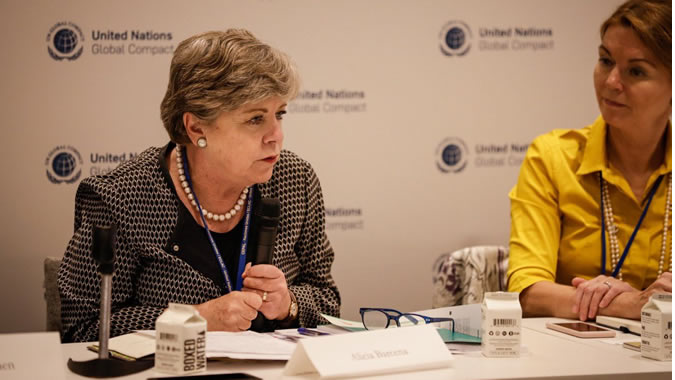Alicia Bárcena: The Conversation Must Change between Governments, the Private Sector and Civil Society to Meet the SDGs
Work area(s)
ECLAC’s Executive Secretary took part in an event organized by the UN Global Compact and the permanent missions of Argentina and Lebanon on the sidelines of the High-Level Political Forum on Sustainable Development going on through Friday in New York.

“The conversation between governments, business and civil society must change. All actors must have a dialogue about what sectors and economic activities can take us more quickly toward fulfillment of the 2030 Agenda,” sustained Alicia Bárcena, Executive Secretary of the Economic Commission for Latin America and the Caribbean (ECLAC) on Thursday, July 18 in New York.
Bárcena offered closing remarks at the event Global Compact Network: Making global goals global business, organized by the United Nations Global Compact and the permanent missions of Argentina and Lebanon to the United Nations, on the sidelinnes of the High-Level Political Forum on Sustainable Development being held through Friday, July 19 in New York.
Participants in the meeting included Lise Kingo, Executive Director of the UN Global Compact; Gabriela Agosto, Executive Secretary of Argentina’s National Council for the Coordination of Social Policies of Argentina; Lisa Kurbiel, Head of the Secretariat for the Joint SDG Fund at the UN Development Coordination Office; and Lotta Tahtinen, Chief of Outreach and Partnerships Branch at UN DESA Division for SDGS, among other representatives.
During her remarks, the ECLAC senior representative called for reflection on what the paradigm shift toward more sustainable development really means. Do we want any type of energy? Or renewable energies? Do we want any type of transportation? Or electromobility? Let’s sit down together, like we are at this table, and come to agreement on what the most important needs of each region are and where the private sector can make a difference,” she proposed.
The public and private sectors must enter into dialogue, she said, on how to reform our tax systems to increase the fiscal space of countries to achieve the Sustainable Development Goals (SDGs).
“We want multinationals to pay taxes in the places where they are making their earnings,” she emphasized. Through taxation we can advance, for instance, toward the reduction of sugar consumption in the population and the abandonment of fossil fuels,” she asserted.
The problem in Latin America and the Caribbean, sustained the official, is not only poverty, it is also inequality. “Twenty percent of the highest income is receiving 45 percent of GDP productivity gains,” she said.
Alicia Bárcena also called on companies to get more actively involved in the challenges of migration, especially in Central America’s northern triangle. “Migration has to be an option, not an obligation,” she underscored, urging the private sector to invest in these countries to confront the structural causes of this phenomenon. She went on to ask for a reduction in the costs of remittance transactions.
Furthermore, the ECLAC Executive Secretary warned about the changes in the field of education and their impact on labor competition. “Education has changed entirely; the paradigm is shifting. The private sector must tell the public sector what skills are needed in the workplace,” she highlighted.
Type
Country(ies)
- Latin America and the Caribbean
Related link(s)
Contact
Public Information Unit
- prensa@cepal.org
- (56 2) 2210 2040